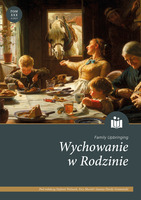Typy osobowości i temperamentu a style radzenia sobie ze stresem matek dzieci z zaburzeniami ze spektrum autyzmu
Personality and temperament types and stress coping strategies of mothers of children diagnosed with autism spectrum disorder
Author(s): Justyna Świerczyńska, Beata Pawłowska, Izabela Chojnowska-Ćwiąkała, Aleksandra LatałaSubject(s): Social Sciences
Published by: Zakład Historii Edukacji w Instytucie Pedagogiki Uniwersytetu Wrocławskiego
Keywords: cechy osobowości matki; zaburzenia ze spektrum autyzmu; radzenie sobie ze stresem; typy temperamentu matki
Summary/Abstract: Introduction. Parents raising a child diagnosed with autism experience numerous challenges related to caring for the child, which impact the levels of stress they undergo. Aim. The aim of the study was to analyse the relationship between personality and temperament traits in mothers raising children diagnosed with disorders within the autism spectrum (AS D) and their stress coping strategies. The study also sought answers to the question of whether examined mothers, differing in personality and temperament types, significantly differ in their preferred stress coping strategies. Materials and methods. The study involved 58 women raising children with a medical diagnosis of disorders within the autism spectrum (acc. to DSM-5). Various research tools were applied in the study, such as a custom survey, the Coping Inventory for Stressful Situations (CISS ), the adult version of the EAS -D Temperament Questionnaire, and the Polish adaptation of the 10-item Big Five Personality Inventory (TI PI-PL). Results and conclusion. The results of statistical analyses indicate the presence of statistically significant negative correlations between mothers’ personality factors such as extraversion and emotional stability and stress coping emotions-oriented strategies. Positive correlations were found between the temperament traits of the examined mothers – negative emotionality and stress coping strategies focused on emotions and avoidance. Based on the cluster analysis, two groups of mothers were identified: those with introverted/emotionally unstable/negative emotionality personality type and those with extraverted/emotionally stable/positive emotionality personality type, significantly differing in their preferred stress coping strategies. Personality traits of the examined women, such as increased introversion, shyness, and neuroticism are significantly correlated with a preference for stress coping strategies focused on emotions. Temperament traits of the examined women, such as a tendency to react with dissatisfaction, anger, and aggression (i.e., negative emotionality) are correlated with stress coping strategies focused on emotions and avoidance. Women with an introverted/emotionally unstable/negative emotionality personality type significantly more often employ stress coping strategies focused on emotions in stressful situations than do women with an extraverted/emotionally stable personality type.
Journal: Wychowanie w Rodzinie
- Issue Year: XXX/2023
- Issue No: 4
- Page Range: 307-327
- Page Count: 21
- Language: Polish

